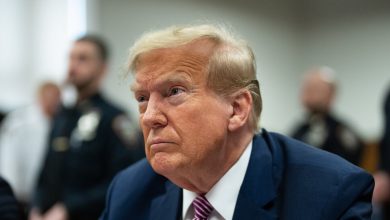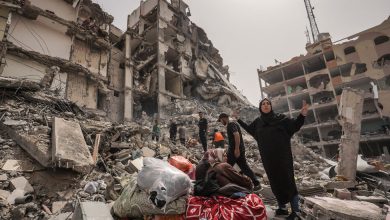Pakistan Reaches Cease-Fire With Resurgent Taliban Militants

ISLAMABAD, Pakistan — A cease-fire between Pakistan and the Pakistani Taliban went into effect Tuesday, weeks after Prime Minister Imran Khan announced that his government was in talks with some militant groups that were willing to lay down arms in return for amnesty.
The Pakistani authorities say that the monthlong agreement could be extended if negotiations with the Pakistani Taliban, a banned militant group responsible for some of the country’s worst terrorist attacks, made further progress.
The cease-fire with the group, also known as Tehreek-e-Taliban Pakistan, appeared to be the most significant step toward peace in the country since 2014, when negotiations with the insurgents broke down and the Pakistani military launched an operation to wrest parts of the northwest out of their control.
The agreement was announced by the Pakistani information minister, Fawad Chaudhry, on Monday. Confirming the cease-fire, a spokesman for the Pakistani Taliban, Muhammad Khurasani, said in a statement that it would remain in effect through Dec. 8.
Mr. Khurasani said both sides had formed committees for the talks. Pakistani officials have not publicly shared details about those negotiations, but in the past, the Pakistani Taliban have made the release of prisoners a precondition.
Mr. Khurasani also claimed that the Afghan Taliban were acting as a mediator in talks between the Pakistani government and local militant groups, though a top Afghan official, Zabihullah Mujahid, denied that.
“There have been no involvement of the officials of the Islamic Emirates of Afghanistan, nor were we invited to be part of any negotiations on an official level,” Mr. Mujahid said. “Therefore, I can tell you that we have not been involved in such talks, nor are we aware of it. There might be some mediation at a local level, but I do not confirm our involvement in an official level.”
The Pakistani Taliban and the Afghan Taliban are separate entities, though they draw strength from some of the same ideological and religious moorings. While Pakistan’s military has been fighting the Pakistani Taliban, it has long been accused of nurturing the Afghan Taliban.
While the Pakistani military made substantial gains in successive military offensives against the group and other militants, some Pakistani Taliban commanders were able to find refuge in neighboring Afghanistan, officials say. Their presence there has been a source of friction between Pakistan and the previous American-backed Afghan governments, who accused Pakistan of nurturing the Afghan Taliban insurgency and sheltering its leaders for years.
Since 2007, the Pakistani Taliban have been responsible for a series of devastating terrorist attacks, among them an attack on a school in Peshawar that killed 145 people in 2014, and a 2009 attack on the headquarters of the Pakistani military. They also tried to kill Malala Yousafzai, the world-renowned campaigner for female education who recovered from severe gunshot injuries to her head and neck to go on to win the Nobel Peace Prize. The Pakistani Taliban have also claimed responsibility for attacks on the Chinese presence in the country.
Despite the failure of past peace talks, Pakistani officials say they are optimistic about the new round of negotiations, which started after the Afghan Taliban took power in August.
Prime Minister Khan has long said that he favors negotiations over military action. He was an outspoken critic of the American invasion of Afghanistan and opposed the Pakistani military’s campaigns against local Taliban groups in the rugged northwestern regions that border Afghanistan.
Understand the Taliban Takeover in Afghanistan
Who are the Taliban? The Taliban arose in 1994 amid the turmoil that came after the withdrawal of Soviet forces from Afghanistan in 1989. They used brutal public punishments, including floggings, amputations and mass executions, to enforce their rules. Here’s more on their origin story and their record as rulers.
Who are the Taliban leaders? These are the top leaders of the Taliban, men who have spent years on the run, in hiding, in jail and dodging American drones. Little is known about them or how they plan to govern, including whether they will be as tolerant as they claim to be. One spokesman told The Times that the group wanted to forget its past, but that there would be some restrictions.
How did the Taliban gain control? See how the Taliban retook power in Afghanistan in a few months, and read about how their strategy enabled them to do so.
What happens to the women of Afghanistan? The last time the Taliban were in power, they barred women and girls from taking most jobs or going to school. Afghan women have made many gains since the Taliban were toppled, but now they fear that ground may be lost. Taliban officials are trying to reassure women that things will be different, but there are signs that, at least in some areas, they have begun to reimpose the old order.
What does their victory mean for terrorist groups? The United States invaded Afghanistan 20 years ago in response to terrorism, and many worry that Al Qaeda and other radical groups will again find safe haven there. On Aug. 26, deadly explosions outside Afghanistan’s main airport claimed by the Islamic State demonstrated that terrorists remain a threat.
How will this affect future U.S. policy in the region? Washington and the Taliban may spend years pulled between cooperation and conflict. Some of the key issues at hand include: how to cooperate against a mutual enemy, the Islamic State branch in the region, known as ISIS-K, and whether the U.S. should release $9.4 billion in Afghan government currency reserves that are frozen in the country.
Opponents have accused Mr. Khan of being a sympathizer of the militants, and news that negotiations were taking place with them renewed that criticism.
Bilawal Bhutto Zardari, leader of the opposition Pakistan Peoples Party, questioned the decision of Mr. Khan’s government to engage with the militants without consulting Parliament. “A policy approved by the Parliament will be a better policy,” he said after attending a parliamentary meeting on national security Monday.
Mr. Chaudhry, the information minister, speaking at a televised news briefing Tuesday, said that the fighting had to come to an end. He said some of the militants wanted to shun violence and become part of the national fold.
“The state of Pakistan wants to give its citizens a chance if all of them, some of them or a fraction of them want to come back and show their allegiance to the Constitution of Pakistan,” Mr. Chaudhry said.




